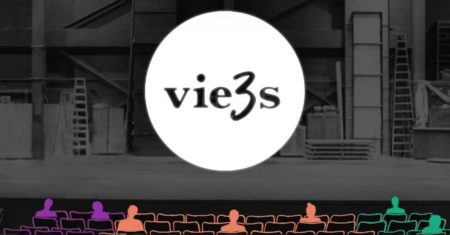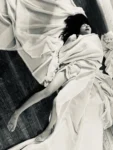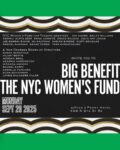Almazan is awarded The Bret Adams and Paul Reisch Foundation Grant for the cancelled production of La Paloma Prisoner Project due to COVID-19. Thank you to 3Views on Theatre for this interview, a place to deeply reflect about our current condition as theatre makers and our future.
View the feature: HERE
WHAT IS THE STORY OF YOUR PLAY?
La Paloma Prisoner is a multi-disciplinary play about the reclamation of identity by women in the Colombian prison system. Based on the true story of a group of incarcerated women selected as beauty queen contestants at the Buen Pastor prison in Bogotá, this new play interweaves the ritualistic journey of a “parade of prisoners” within Colombia’s social, political, and spiritual history. The play centers on an infamous woman nicknamed “La Paloma” who transcendentally soars beyond physical and societal barriers to avenge the raped women of Bogotá. Her actions revolutionize the women’s lives, Bogotá’s prison society, and the world beyond its walls.

HOW LONG HAVE YOU BEEN WORKING ON THE PROJECT AND WHAT STAGE OF PRODUCTION WAS YOUR PLAY IN BEFORE EVERYTHING SHUT DOWN?
For a decade this project has taken the form of play presentations, panels, conferences, activist demonstrations, advocacy think tanks, workshops and community partnerships with organizations dedicated to serving impacted people.
The script has been in development for over ten years, across four countries. Workshop production at The Signature Theatre Off-Broadway. (Selected for World Theatre Day: Performing Gender and Violence in Contemporary National and Transnational Contexts Conference in Rome, Italy. Tre Roma University reading) (Women’s Playwrights International Conference, Stockholm, Sweden) (The Lark Play Development Reading, NYC) (Labyrinth Theatre Intensive reading) (Staged Reading at La Mama ETC and INTAR). Critical Breaks Residency directed by Estefania Fadul (Hi-Arts). Attendance in Bogota, Colombia at the (Buen Pastor Prison) for the Annual Celebration and Beauty Pageant.
Developed from Raquel Almazan’s longstanding work with incarcerated and impacted communities, the play was scheduled for its World Premiere at Next Door @ New York Theatre Workshop, alongside a series of initiatives aimed at raising awareness and inciting action towards the end of global mass incarceration. The project includes programs designed to uplift the voices and narratives of current and formerly incarcerated women-identified folx of color through performances/workshops in prisons, conversation circles, and panel discussions leading up to the production’s scheduled run at NYTW. Follow updates at: https://www.lapalomaprisonerproject.com/
We were set to begin rehearsals the third week of March and halted our process due to the COVID-19 pandemic. Our original dates ran April 19 to May 9, 2020.

WHAT MOMENT OR IMAGE FROM YOUR PLAY ARE YOU MOST LONGING TO SEE EMBODIED ON A STAGE?
I have been guided by strong women throughout my life, who inspire me to create art works and social change in relationship to the conditions of women, their history and a voice for their futures; that began my dedication as an arts facilitator to children, teens, and institutionalized women. As a form of empowerment I began to see visions in my dreams of a superheroine who defended all women against abuse, taking justice into her own Latinx hands. As a playwright, in 2008, these theatricalized supernatural visions were the beginning of crafting the incarcerated demigod character La Paloma. The moment I am most anticipating is the moment of flight, ascension for La Paloma; how walls are broken down through theatricalization, the imagination, sound, lights, and ultimately the spirit. I’m greatly frustrated by physical walls as a theatermaker, most spaces are confined by walls, be it real or the imposed fourth wall, and for me I am most ignited by breaking barriers between the audience and the maker. I am looking forward to exploring how flight and freedom are embodied in the production.

SINCE EVERYTHING HAS CLOSED, HOW ARE YOU COPING?
Most days I am teaching online with youth who are creating a variety of art works: documentary films, craftmaking, original music, dance, and playwriting. The young people have lifted me up and reminded me that creativity does not have barriers, that singing together, processing pain collectively is essential to our well-being.
A lot of my time is also spent working with the Indie Theater Fund, as president of the board, I’m honored to be part of an organization that has raised and distributed more than $100,000 to independent artists and venues in response to the COVID-19 pandemic. Our online community events have provided connectivity and opportunities to be in solidarity during this time.
What is also giving me life right now is a Spanish translation of La Paloma Prisoner is currently being written by Mariana Carreño King. We will have an online Zoom reading open to the public the evening of June 16 via Repertorio Espanol. Check the Repertorio site closer to the date for RSVP details.
Every day at 7 p.m., I run to my window to witness the cheering, applauding, instrument playing on the street, dedicated to essential workers and our resiliency as New Yorkers.

HOW DO YOU HOPE THEATER EVOLVES AFTER THE PANDEMIC IS OVER?
There are large sacrifices one makes to pursue theater not just as a profession but as a life’s journey; to have institutions aware of the fragility of the lives of artists is key in our field. My hope is that an anti-oppression, anti-racist framework is instilled in every theater, as we are going to need a framework of maintaining our community in order to continue as a field. I hope that urgency in narratives, what is most at stake, stories of people of color, and immigrant representation are prioritized on stages. That the visibility of vulnerable communities most affected by COVID-19 will also be reflected in the allocation of resources in our field, that we radically distribute resources for POC, LGBTQIA, immigrant, and disabled artists. That our theater field cultivates a responsive lens in curating, in its mission, including the evaluation of high-paid salaried positions vs freelance positions in our field.
I also hope I never have to see a couch on stage again.

WHAT QUESTION WOULD YOU LIKE TO ASK OTHER WRITERS GOING THROUGH THIS RIGHT NOW?
I’d like to ask writers how they are reflecting about our field:
How do we have more agency in the process of building our work?
How will we take care of our collaborators during the process when you come back into physical spaces?
How can we keep the costs of staging stories to a minimum?
Do we adjust the notion of the “fully produced” production and return to what is essential in storytelling, collective experience?
How does this naturally drive us to stage what is most urgent?
How can we continue to collectively shape the “theater” we return to?




